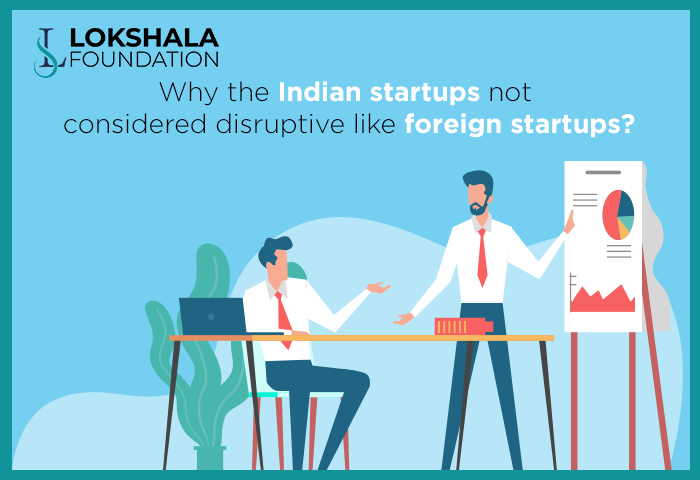In recent times India’s startup landscape has undergone tremendous growth, with several innovative enterprises venturing into diverse sectors. However, Indian startups have frequently drawn flak over their perceived inability to disrupt markets like their foreign counterparts. Through this article, we aim to investigate and comprehend why such beliefs exist while also examining other possible factors shaping these differences.
1. Financing Issues Startup
The unavailability of substantial financial support poses a significant hurdle for Indian startups‘ disruptive potential. Despite witnessing increased investor interest, India’s overall funding climate pales compared to major global markets such as Silicon Valley.
Restricted capital could restrain or limit the ability of Indian firms to scale up operations and innovation capabilities that might ultimately challenge existing industry norms.
2. Infrastructure and Regulatory Restraints
Indian enterprises have a daunting task ahead as they battle with insufficient infrastructure availability coupled with bewildering regulatory frameworks. The unstable facilities, like interrupted power, unstable internet connection in remote areas, and traffic, become another reason why the Indian startups are not disruptive as the foreign startups.
The intricacy involved when navigating through complicated legal requirements adds a considerable strain on the time taken & resources deployed, hampering initiative agility and posing setbacks on startups’ innovation potential.
3. Risk aversion and cultural mindset
India’s deep-rooted traditions have shaped its culture towards an emphasis on stability and a preference for safer career choices. Pursuing one’s own dreams may therefore be discouraged due to this overarching societal framework which prizes job security above all else.
Entrepreneurs face an additional hurdle as they look for ways to disrupt established markets with innovative ideas. Investors wary of risk may prefer to invest in familiar business models rather than supporting new and innovative startups.
4. Emphasis on localisation and replication
Many Indian enterprises have prioritised the implementation of triumphant global business models within the national market. Although such a tactic has its merits, there can be the inadvertent implication that minimal upheaval will occur as such companies are often perceived as imitations rather than original concepts. To boost the brand, Indian companies must mix the use of tried-and-tested ideas and concepts with actual innovation.
5. Education and Skill Gap
While the Indian educational system has historically placed less emphasis on promoting creativity, critical thinking, and entrepreneurial skills, it is excellent in technical subjects. The capacity of Indian companies to create revolutionary ideas and successfully implement them may be constrained by the absence of a strong entrepreneurial education ecosystem. Making a culture of creativity and disruption requires addressing this education and talent divide.
6. Fragmentation and market dynamics
India has an enormous and diverse market that offers opportunities and difficulties for startups. Localised strategies are necessary for success due to the fragmented nature of the market, which includes different regional preferences, languages, and cultural nuances. Disruptive ideas’ influence, however, can be hampered by the resource-diversion and scalability issues caused by catering to several market categories.
Conclusion
While startups in India have seen massive success in the last few years, but there are still some issues that they face. Various underlined issues conclude that Indian startups are not disruptive as their international counterparts. This impression is influenced by a combination of factors, including inadequate finance, infrastructure limitations, regulatory complexity, cultural attitude, replication-focused initiatives, education deficiencies, and market dynamics.
Policymakers, educational institutions, investors, and businesses work together to resolve these issues. Indian companies can unleash their true disruptive potential and establish themselves as global leaders in innovation by establishing an enabling ecosystem that promotes risk-taking, innovation, and scalability.
FAQs :
-
Why are the Indian startups struggling?
Due to their greater dependence on funding and lack of technological expertise, Indian entrepreneurs have experienced a greater pinch.
-
Are the Indian startups boosting entrepreneurship
Yes, “Startup India”, the Govt. of India initiative, boosts entrepreneurship by focusing on investment and technical aspects.
-
What is the biggest problem for startups?
Lack of infrastructure and capital is among the most significant issues Indian businesses encounter. Although venture capital investment has increased recently, getting finance remains a substantial issue, particularly for early-stage startups and those working in specialised industries.
-
What is the rank of Indian startups in the world?
India is the 3rd largest hub of startup ecosystem all over the world.
-
What is the success rate of startups in India?
Indian startups have a relatively higher success rate than the rest of the world. According to the Department for Promotion of Industry and Internal Trade (DPIIT), the success rate of Indian startups is around 20%, which is significantly higher than the global average of 10%.


